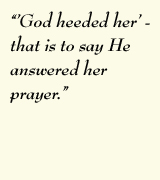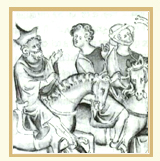Rachel
Although she was the beloved wife, Rachel’s attempts at bearing Jacob sons meet with no success. In a fit of pique Rachel hurls her anger and frustration upon Jacob.
When Rachel saw that she had borne Jacob no children, she became envious of her sister; and Rachel said to Jacob, “Give me children, or I shall die!” Jacob was incensed at Rachel, and said, “Can I take the place of God, who has denied you fruit of the womb?”
(Gen. 30:1-8)
Indeed, Rachel did conceive of Jacob as being in the place of God, as the sole source of fulfillment in her life. In her unconditional and devoted love for him, which alienated her from her father and the rest of her family, Rachel, like Sarah before her did not have a direct relationship with God hence she relied upon her husband to provide her deliverance. However, in Rachel’s case this notion is not patently obvious.
Jacob adamantly answered, “Can I take the place of God, who has denied you fruit of the womb?” His words at once reveal and conceal. Jacob may be giving expression to his deep-seated desire to live up to Rachel’s expectations, and to provide her with that which she desired most. Would that he was God-like, able to bestow life and redeem her once and for all from her living death! Yet perhaps in the deepest realm of his subconscious Jacob was distressed by Rachel’s lack of comprehension. Jacob was the son of Isaac and the grandson of Abraham; he understood that Rachel’s barrenness was not a matter of biological chance. His mother Rebecca did not conceive his parents facilitated it through intense prayer, and his grandmother Sarah had in her time given birth to Isaac only after God’s direct miraculous intervention. The births of Jacob’s children were an expression of the covenant that God had made with Abraham, a step along the road of national destiny. How God might decide to bring about that destiny was far beyond Jacob’s ken, and he knew it; man cannot take the place of God. One must turn directly and pour out one’s heart to Him.
Ironically, what underlies Rachel’s outburst is her desperate request that Jacob pray for her. Nachmanides sums it up as follows:
And if not I shall die…She thought that out of his love for her Jacob would fast, don sack cloth and ashes and pray until she would have children and not die through her pain.
(Commentary to Gen. 30:1)
The following midrashic rendition of the exchange paraphrases Rachel’s fighting words as follows:
Give me children, or I shall die!” If you want me to give birth do what you father Isaac did when his wife was barren, he prayed for her as it says, vayetar Yitzhak do what your grandfather Abraham did.
(Aggadat Bereishit 52)
R. Abraham Sabba, author of the 15th century biblical commentary Zeror Hamor, explains that God’s remembrance of Rachel resulted not from anything that she had done; rather, ironically, this came about only when Rachel had despaired of achieving her wish. It was then that she prayed.
And God remembered Rachel. This statement intimates that all of her efforts and diligence were useless: not her giving her maidservant [to Jacob], nor her purchasing the mandrakes from her sister (as mandrakes would have taken effect immediately). God, however, arranged matters so that a year, two, or three passed, during which time Issachar, Zebulun and Dinah their sister were born. Only then did God remember Rachel. It therefore states “God remembered her,” as if she had been forgotten, in order to emphasize to her that attempting to manipulate nature was futile; [she conceived] only through the name of God who communicated to her…that is the meaning of, ‘God heeded her’ that is to say He answered her prayer.
(Zeror HaMor, Gen. 30:22)
Tikkun Rachel and Tikkun Leah
The biblical text must be carefully mined to unearth the subtle prayers of Rachel and Leah. However, these two matriarchs served as the inspiration for a most unusual prayer called Tikkun Chatzot, comprised of two sections Tikkun Rachel and Tikkun Leah. This prayer was composed in 1587 by Rabbi Abraham ben Eliezer HaLevi Berukhim (1515-1593). Rabbi Berukhim was born in Morrocco but emigrated to Zefat, where he initially joined Moses Cordovero’s circle and later became part of the school of Rabbi Isaac Luria (known as the Ari). As a spiritual leader Berukhim serviced a community of Jews who had survived the cataclysm of the Spanish Inquisition. Many had lived through the horror of watching their families forced to chose between the cross or the sword. Others were children of these survivors . They had been expelled from Spain and Portugal. They had undergone the unbearable travail of exile and managed to build a new life in the Galillean city of Zefat. Rabbi Berukhim composed Tikkun Chatzot– a night vigil, as a spiritual catharsis. The prayer included elements of mourning for the destruction of the Temple which resonated in the lives of these survivors. It also gave expression to the yearning for a brighter future and the restoration of the shattered relationship with the Divine. The very name of the prayer Tikkun Chatzot bespeaks its purpose. It was a prayer to be said at midnight. During this time of blessed silence, one could surrender to God and find peace with the world and its creator. The prayer constituted a tikkun — an attempt to repair that which was broken. The notion of tikkun was developed in Lurianic Kabbalah as a response to the expulsion of Spanish Jewry. The general outline is that God’s absence, philosophically described in terms of zimzum (His having constricted His presence) brought about svirat hakelim (broken vessels) in need of repair. Man’s job post-destruction was to work at tikkun (repair). The four areas of tikkun were tikkun atzmi (personal correction), tikkun ham (national repair) , tikkun olam (repairing the world) and tikkun of the Creator as it were. The last element is explained in terms of bridging the gap between man and God. How could this tikkun come about? Classically it was taught that this could be achieved through Torah study, mitzvoth, and prayer. One such prayer was tikkun chatzot which included liturgical passages and Torah study related to the churban (destruction) and the restoration. Why was this prayer said in the middle of the night? The Rabbis suggest that night study is likened unto Temple service:
Bless God, all God’s servants who stand in the house of God in the nights.(Ps. 134:1). Rabbi Yochanan said: Those who study Torah at night are considered as if they were engaged in the Temple service.
(Menachot 110a)
Although the ultimate destruction in Jewish life was that of the Temple, Tikkun chatzot related directly to the expulsion from Spain and Portugal. Moreover, it gave expression to the crushing effects that these historic events had on the personal lives of the Jews living in Zefat and world-wide. In the words of Rabbi Nachman of Breslav:
Reciting Tikkun Chatzot can bring you to open your heart and express your innermost feelings to God just as in private prayer. The Chatzot prayers do not only refer to the historical past. More important, they refer to what each individual is going through in the present. Once you realize this, you can find all your own inner conflicts and your struggles with the evil inclination expressed in the prayers of Chatzot.
(Likutey Moharan II,101)
And so, as the clock struck twelve the prayer began. It commenced in the dead of night and moved toward the light.[1]Reports describe Rabbi Abraham HaLevi Berukhim making the rounds to encourage his constituency to wake up at midnight and recite the night vigil.
At midnight he would arise and wander through the streets crying and shouting a painful and bitter cry for the honor of God may He be blessed since the Holy Spirit is in exile and the holy and glorious Temple was burnt down and the people of Israel underwent terrible troubles. All of this he would declare in a bitter voice and loud wailing. He did all this loudly so others would hear and learn from him. To bring merit to others. He would call every scholar by name and not leave him until he saw him get out of bed. At that hour voices could be heard in the entire community voices of study of Mishnah, Gemara, Zohar, midrashic of our Rabbis of blessed memory and of psalms and prophets and refrains of prayers, supplications and requests. (Meir Benayahu, Sefer Toldot Haari 227-8)
Tikkun Chatzot, recited by Jews to this very day contains two parts — Tikkun Rachel and Tikkun Leah. The first section Tikkun Rachel is a series of laments for the destruction of the Temple and catastrophes that have befallen the Jewsh people in exile and the Shechinah (divine presence) in Exile. Beyond reflecting the trials and tribulations that Rachel underwent in her personal life, the prayer in large measure reflects Jeremiah’s portrait of Rachel.
Thus said the Lord:
A cry is heard in Ramah
Wailing, bitter weeping
Rachel weeping for her children.
She refuses to be comforted
For her children, who are gone.
(Jer. 31:14)
Jeremiah’s comforting words to Rachel assure her that in time her situation will be reversed. This prophecy resonates in the Tikkun Rachel prayer:
Restrain your voice from weeping.
Your eyes from shedding tears;
For there is reward for your labor
Declares the Lord
They shall return from the enemy’s land
And there is hope for your future
Declares the Lord,
The children shall return to their country.
(Jer. 31:16-17)
The second section of the prayer, Tikkun Leah contains psalms and praises describing intense yearning to commune with the divine. Since Leah longed so deeply for her husband and ultimately, Jacob became Israel, the union of Leah and Jacob symbolizes the union of God and the people of Israel. Together Rachel and Leah represent the ability of love and faith to help us weather the storms of life. The reversal of fortune in the lives of these two women give us perspective about that which we ourselves undergo. Tikkun chatzot is directed to God and built around our relationship with Him. Rachel’s life seemed ideal. Her beauty led her to Jacob, with full assurance that she would become his only beloved wife. That prayer was not answered in the idyllic way Rachel had envisioned. Her dream of children was also deferred, and when finally granted new life, Rachel died in childbirth. Leah, on the other hand moved from the position of the wife who was despised to matriarch of Israel. It was Leah who was ultimately laid to rest in the cave of Machpelah along side her husband Jacob. These women of destiny convey to direct our prayers to the Master of the Universe with faith that He will steer our proper course.
References
| ↑1 | Reports describe Rabbi Abraham HaLevi Berukhim making the rounds to encourage his constituency to wake up at midnight and recite the night vigil.
At midnight he would arise and wander through the streets crying and shouting a painful and bitter cry for the honor of God may He be blessed since the Holy Spirit is in exile and the holy and glorious Temple was burnt down and the people of Israel underwent terrible troubles. All of this he would declare in a bitter voice and loud wailing. He did all this loudly so others would hear and learn from him. To bring merit to others. He would call every scholar by name and not leave him until he saw him get out of bed. At that hour voices could be heard in the entire community voices of study of Mishnah, Gemara, Zohar, midrashic of our Rabbis of blessed memory and of psalms and prophets and refrains of prayers, supplications and requests. (Meir Benayahu, Sefer Toldot Haari 227-8) |
|---|



